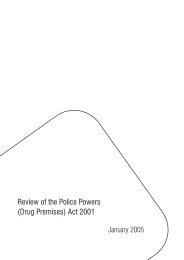Crimes (Forensic Procedures) Act 2000 - NSW Ombudsman - NSW ...
Crimes (Forensic Procedures) Act 2000 - NSW Ombudsman - NSW ...
Crimes (Forensic Procedures) Act 2000 - NSW Ombudsman - NSW ...
You also want an ePaper? Increase the reach of your titles
YUMPU automatically turns print PDFs into web optimized ePapers that Google loves.
10.7.12.4. Case conferencing<br />
We understand that <strong>NSW</strong> Police is also considering case conferencing, where DAL, FSG and investigating police<br />
meet to discuss and agree on a forensic strategy for each complex case received. 1050 There is some merit in this<br />
approach, however it is not clear in how many of the thousands of cases submitted to DAL each year this would<br />
occur. Given that DAL’s resources are already stretched, this proposal may not be realistic.<br />
While case conferencing may enable DAL to ensure investigating police have clear expectations about what forensic<br />
analysis is possible, it may also compromise DAL’s independence from the law enforcement agencies. This issue<br />
would need to be considered prior to case conferencing being introduced.<br />
10.8. The future of DNA analysis in New South Wales<br />
It is clear that while DAL is achieving some good results, there are significant problems with the DNA analysis service<br />
it provides to <strong>NSW</strong> Police. In particular:<br />
• DAL is unable to process the amount of DNA casework submitted by <strong>NSW</strong> Police<br />
• DAL cannot provide DNA analysis results in some cases, including some serious offences, in a reasonable<br />
timeframe<br />
• the capacity to analyse crime scene samples from serious ‘old’ unsolved crimes is very limited<br />
• there is an unknown amount of inaccurate information on the DNA database system<br />
• DAL needs a better system for tracking samples from receipt through to destruction, and<br />
• DAL could improve the way it measures and reports on outcomes.<br />
We acknowledge that DAL has made significant efforts to improve its service delivery, and that many of the factors<br />
contributing to the situation are beyond DAL’s control. We also note that the new procedures proposed by <strong>NSW</strong><br />
Police, including screening all crime scene samples prior to submission, have the potential to lead to improvements<br />
in the system.<br />
However, there are significant risks associated with the service DAL is currently providing. While DAL continues to<br />
receive more casework than it can process, exhibits (including some with significant probative value) will continue to<br />
remain unexamined. This negates some aspects of the <strong>Act</strong>, including the requirement that DNA samples can only<br />
be taken from suspects where this is likely to confirm or disprove the suspect committed an offence, if the relevant<br />
crime scene evidence cannot be examined prior to the retention period expiring. In addition, the risk of contamination<br />
increases and the use of the database as an intelligence tool is hampered. It appears that DAL cannot significantly<br />
improve its DNA analysis service without additional resources.<br />
10.8.1. Preferred model for the DNA analysis service<br />
<strong>NSW</strong> Police’s preference is for DAL to maintain the DNA database and remain the principal service provider in DNA<br />
analysis, while some simple analysis is outsourced to a private laboratory and some of the preliminary examination of<br />
crime scene samples is conducted within <strong>NSW</strong> Police, in the new forensic service centre.<br />
DAL’s preference, on the other hand, is for a single, independent, adequately funded DNA analysis service. It also<br />
appears DAL supports direct funding rather than a fee for service model, on the basis that it provides a quality service<br />
including ongoing research and development, rather than simply providing the cheapest testing. 1051<br />
The proposal for a DNA analysis service that is not only financially independent but also self-governing provides the<br />
community with greater confidence in the justice system and the legitimacy of the analysis results provided. This is the<br />
approach adopted by a number of other jurisdictions, such as New Zealand’s Environmental Science and Research<br />
Limited (ESR) and the United Kingdom’s <strong>Forensic</strong> Science Service (FSS). Both of these agencies are self-funded<br />
organisations that have entered into contracts with their relevant police forces to provide analysis services.<br />
Whilst New South Wales at this stage has a forensic service separate from <strong>NSW</strong> Police, the proposal by <strong>NSW</strong> Police<br />
to have some in-house analysis and examination of crime scene samples would be inconsistent with current trends. A<br />
recent report by the Law Reform Commission of Ireland recommended the establishment of an independent statutory<br />
body that would incorporate the <strong>Forensic</strong> Science Laboratory and the DNA database in one agency, which would be<br />
governed by a board of representatives such as:<br />
<strong>NSW</strong> <strong>Ombudsman</strong><br />
DNA sampling and other forensic procedures conducted on suspects and volunteers under the <strong>Crimes</strong> (<strong>Forensic</strong> <strong>Procedures</strong>) <strong>Act</strong> <strong>2000</strong> 215

















